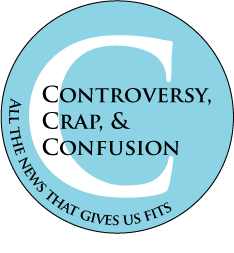
« Able Danger Conference Call | Main | Backstabbers At State Unhappy With Changes »
 Today's New York Times issues what has to be the most irresponsible editorial within memory, no mean feat for the Paper of Record's editorial board. Today, they try their hand at health reporting and manage to make Meryl Streep look like a cynic during the Alar scare.
Today's New York Times issues what has to be the most irresponsible editorial within memory, no mean feat for the Paper of Record's editorial board. Today, they try their hand at health reporting and manage to make Meryl Streep look like a cynic during the Alar scare.
The subject of the paper's venture into scientific hysteria? Aspartame, otherwise known as NutraSweet, a sugar-free sweetener that has been on the market for two decades. The Times breathlessly reports a new study saying ASPARTAME CAN KILL YOU!
Aspartame, an artificial sweetener used by more than 200 million people around the world, has passed numerous safety evaluations in the past quarter-century. It is used as a tabletop sweetener (Equal, NutraSweet) and as an ingredient in more than 6,000 processed foods, including diet sodas, desserts, candy and yogurt, among others. But now comes a provocative if inconclusive report that says aspartame may cause cancer, even at levels long considered safe.
Only after reminding readers that aspartame is in EVERYTHING THEY EAT does it toss in a curious modifier. Inconclusive? If it's inconclusive, why does the Times make it a subject of its unsigned editorial?
There is no reason for panic, but surely good reason for regulatory authorities to look again at this much-studied sweetener.
Don't panic, but someone in the government should get to banning NutraSweet. Okay, I'm not panicking. Much.
The new alarm was raised by a large study in laboratory rats conducted at the European Ramazzini Foundation in Italy. The study found a statistically significant increase in lymphomas, leukemias and other cancers in rats that were fed aspartame for a lifetime and compared with rats that were not. Excess cancers were found even in rats fed doses equal to 20 milligrams per kilogram of body weight, well below the 50-milligram level currently deemed acceptable for humans in the United States. If these results hold up under further scrutiny, the guidelines will need re-evaluation.
Okay, so if I eat 50 milligrams per kilogram every day, the current guidelines say I may be at risk. That would be 4500 milligrams of sweetener a day for a 200-pound man, which seems rather a stretch for even the biggest sweet tooth. The cancer level found in this study would be 1800 milligrams of sweetener. That amounts to eighteen packets of sweetener every day over a lifetime before a 200-lb user would create a risk. If you're eating that much sweetener, folks, you're not fooling anyone. Switch to sugar or get over the sweet tooth, if you have any teeth left.
But wait -- how reliable is this study anyway?
But the study could turn out to be a false alarm. There was an abnormally low incidence of cancers in a key control group, which could have made the cancer rate in rats fed aspartame look worse than it really was. And there was only a very weak relationship between the doses of aspartame administered and the cancer rate, which makes it hard to be sure that aspartame was causing the tumors.
In other words, the researchers fed a ridiculous amount of aspartame to 1900 lab rats and noted that the control group wound up healthier than normal control groups, making the statistical analysis of the experimental group almost worthless. Not only could they not rely on the control-experimental relationship to determine a rate of increase, the researchers found no relationship between levels of exposure to aspartame and an increase of the cancers that the substance supposedly causes. That latter finding should be enough to convince researchers that they barked up the wrong tree ... but then that would not allow the Times to screech about new regulatory action.
And screech they do:
The Ramazzini group has an obligation to make its full findings public quickly if it expects regulators to take urgent action. Meanwhile, consumers of aspartame can either wait for a final verdict or switch to products containing sucralose (Splenda), a sweetener that some food activists deem safer.
I switched to Splenda long ago, but I did it for the taste. I don't eat eighteen packets of Splenda a day, either. Nevertheless, I don't expect regulators to take "urgent action" based on one study with the kinds of flaws that the Times describes, nor would I expect a news organization to get hysterical over the results. The Gray Lady's editorial board long ago gave up that designation, and editorials like these are the reason why.
Sphere ItTrackback Pings
TrackBack URL for this entry is

captain*at*captainsquartersblog.com


My Other Blog!
E-Mail/Comment/Trackback Policy
Comment Moderation Policy - Please Read!
Skin The Site








Hugh Hewitt
Captain's Quarters
Fraters Libertas
Lileks
Power Line
SCSU Scholars
Shot In The Dark
Northern Alliance Radio Network
Northern Alliance Live Streaming!



Des Moines Register
International Herald Tribune
The Weekly Standard
Drudge Report
Reason
The New Republic
AP News (Yahoo! Headlines)
Washington Post
Guardian Unlimited (UK)
New York Times
Los Angeles Times
OpinionJournal
Pioneer Press
Minneapolis Star-Tribune
MS-NBC
Fox News
CNN

Design & Skinning by:
m2 web studios
blog advertising

- dave on Another National Health Care System Horror Story
- brooklyn on Hillary Not Hsu Happy
- rbj on Hillary Not Hsu Happy
- Robin S on Requiem For A Betrayed Hero
- Ken on Hillary Not Hsu Happy
- Robin S. on Requiem For A Betrayed Hero
- RBMN on Hillary Not Hsu Happy
- NoDonkey on Another National Health Care System Horror Story
- Robin Munn on Fred Thompson Interview Transcript
- filistro on When Exactly Did Art Die?










